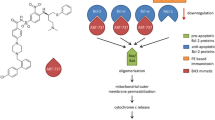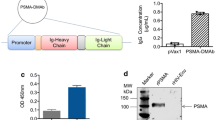Abstract
Prostate cancer is the most commonly diagnosed form of cancer and the second leading cancer-related death among men in the Western civilization. Since no effective therapy exists for this tumor after progression beyond resectable boundaries, there is an urgent need for new treatment strategies. Prostate specific membrane antigen (PSMA) represents an excellent target on prostate cancer cells, and therefore specific immunotherapy may be a novel therapeutic option for the management of this tumor. We constructed a fully recombinant immunotoxin (A5-PE40) from a single-chain antibody fragment (scFv) against cell-adherent PSMA and a truncated form of Pseudomonas exotoxin A (PE40) lacking its natural binding domain Ia. The scFv A5 was obtained from a mAb elicited with native PSMA by phage display technology and direct selection on cells carrying the antigen. The bacterially expressed and purified immunotoxin A5-PE40 specifically binds to PSMA-positive prostate cancer cells and induces a 50% reduction of viability (IC50) at a concentration of 20 pM, while PSMA-negative cells remain unaffected. Due to its high and specific toxicity this recombinant immunotoxin is a promising candidate for therapeutic applications in patients with prostate cancer.







Similar content being viewed by others
References
Bander NH, Trabulsi EJ, Kostakoglu L, Yao D, Vallabhajosula S, Smith-Jones P, Joyce MA, Milowsky M, Nanus DM, Goldsmith SJ (2003) Targeting metastatic prostate cancer with radiolabeled monoclonal antibody J591 to the extracellular domain of prostate specific membrane antigen. J Urol 170:1717–1721
Chang SS, Reuter VE, Heston WD, Gaudin PB (2001) Comparison of anti-prostate-specific membrane antigen antibodies and other immunomarkers in metastatic prostate carcinoma. Urology 57:1179–1183
Chiarodo A (1991) National Cancer Institute roundtable on prostate cancer: future research directions. Cancer Res 51:2498–2505
Davis MI, Bennett MJ, Thomas LM, Bjorkman PJ (2005) Crystal structure of prostate-specific membrane antigen, a tumor marker and peptidase. Proc Natl Acad Sci USA 102:5981–5986
Di Paolo C, Willuda J, Kubetzko S, Lauffer I, Tschudi D, Waibel R, Pluckthun A, Stahel RA, Zangemeister-Wittke U (2003) A recombinant immunotoxin derived from a humanized epithelial cell adhesion molecule-specific single-chain antibody fragment has potent and selective antitumor activity. Clin Cancer Res 9:2837–2848
Fracasso G, Bellisola G, Cingarlini S, Castelletti D, Prayer-Galetti T, Pagano F, Tridente G, Colombatti M (2002) Anti-tumor effects of toxins targeted to the prostate specific membrane antigen. Prostate 53:9–23
Fuchs P, Dubel S, Breitling F, Braunagel M, Klewinghaus I, Little M (1992) Recombinant human monoclonal antibodies. Basic principles of the immune system transferred to E. coli. Cell Biophys 21:81–91
Ghosh A, Heston WD (2004) Tumor target prostate specific membrane antigen (PSMA) and its regulation in prostate cancer. J Cell Biochem 91:528–539
Huang X, Bennett M, Thorpe PE (2004) Anti-tumor effects and lack of side effects in mice of an immunotoxin directed against human and mouse prostate-specific membrane antigen. Prostate 61:1–11
Hwang J, Fitzgerald DJ, Adhya S, Pastan I (1987) Functional domains of Pseudomonas exotoxin identified by deletion analysis of the gene expressed in E. coli. Cell 48:129–136
Israeli RS, Powell CT, Corr JG, Fair WR, Heston WD (1994) Expression of the prostate-specific membrane antigen. Cancer Res 54:1807–1811
Jemal A, Tiwari RC, Murray T, Ghafoor A, Samuels A, Ward E, Feuer EJ, Thun MJ (2004) Cancer statistics, 2004. CA Cancer J Clin 54:8–29
Kawakami M, Nakayama J (1997) Enhanced expression of prostate-specific membrane antigen gene in prostate cancer as revealed by in situ hybridization. Cancer Res 57:2321–2324
Kipriyanov SM, Moldenhauer G, Little M (1997) High level production of soluble single chain antibodies in small-scale Escherichia coli cultures. J Immunol Methods 200:69–77
Klimka A, Barth S, Matthey B, Roovers RC, Lemke H, Hansen H, Arends JW, Diehl V, Hoogenboom HR, Engert A (1999) An anti-CD30 single-chain Fv selected by phage display and fused to Pseudomonas exotoxin A (Ki-4(scFv)-ETA′) is a potent immunotoxin against a Hodgkin-derived cell line. Br J Cancer 80:1214–1222
Liu H, Moy P, Kim S, Xia Y, Rajasekaran A, Navarro V, Knudsen B, Bander NH (1997) Monoclonal antibodies to the extracellular domain of prostate-specific membrane antigen also react with tumor vascular endothelium. Cancer Res 57:3629–3634
Liu H, Rajasekaran AK, Moy P, Xia Y, Kim S, Navarro V, Rahmati R, Bander NH (1998) Constitutive and antibody-induced internalization of prostate-specific membrane antigen. Cancer Res 58:4055–4060
MacDonald GC, Glover N (2005) Effective tumor targeting: strategies for the delivery of armed antibodies. Curr Opin Drug Discov Devel 8:177–183
Marks JD, Hoogenboom HR, Bonnert TP, McCafferty J, Griffiths AD, Winter G (1991) By-passing immunization. Human antibodies from V-gene libraries displayed on phage. J Mol Biol 222:581–597
Orum H, Andersen PS, Oster A, Johansen LK, Riise E, Bjornvad M, Svendsen I, Engberg J (1993) Efficient method for constructing comprehensive murine Fab antibody libraries displayed on phage. Nucleic Acids Res 21:4491–4498
Patri AK, Myc A, Beals J, Thomas TP, Bander NH, Baker JR Jr (2004) Synthesis and in vitro testing of J591 antibody-dendrimer conjugates for targeted prostate cancer therapy. Bioconjug Chem 15:1174–1181
Peipp M, Kupers H, Saul D, Schlierf B, Greil J, Zunino SJ, Gramatzki M, Fey GH (2002) A recombinant CD7-specific single-chain immunotoxin is a potent inducer of apoptosis in acute leukemic T cells. Cancer Res 62:2848–2855
Schulke N, Varlamova OA, Donovan GP, Ma D, Gardner JP, Morrissey DM, Arrigale RR, Zhan C, Chodera AJ, Surowitz KG, Maddon PJ, Heston WD, Olson WC (2003) The homodimer of prostate-specific membrane antigen is a functional target for cancer therapy. Proc Natl Acad Sci USA 100:12590–12595
Silver DA, Pellicer I, Fair WR, Heston WD, Cordon-Cardo C (1997) Prostate-specific membrane antigen expression in normal and malignant human tissues. Clin Cancer Res 3:81–85
Wang S, Diamond DL, Hass GM, Sokoloff R, Vessella RL (2001) Identification of prostate specific membrane antigen (PSMA) as the target of monoclonal antibody 107-1A4 by proteinchip; array, surface-enhanced laser desorption/ionization (SELDI) technology. Int J Cancer 92:871–876
Acknowledgments
We thank Professor W. Wels for providing the PE40 cDNA and Professor M. Little for providing the phagemid pSEX and the vector pHOG21.
Author information
Authors and Affiliations
Corresponding author
Rights and permissions
About this article
Cite this article
Wolf, P., Gierschner, D., Bühler, P. et al. A recombinant PSMA-specific single-chain immunotoxin has potent and selective toxicity against prostate cancer cells. Cancer Immunol Immunother 55, 1367–1373 (2006). https://doi.org/10.1007/s00262-006-0131-0
Received:
Accepted:
Published:
Issue Date:
DOI: https://doi.org/10.1007/s00262-006-0131-0




